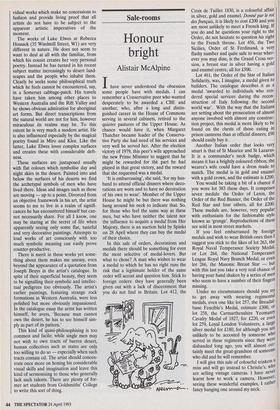Sale-rooms
Honour bright
Alistair McAlpine
Ihave never understood the obsession some people have with medals. I can remember a Conservative peer who wanted desperately to be awarded a CBE and another, who, after a long and distin- guished career in the House of Commons serving in several cabinets, retired to the quieter pastures of the Upper House. As chance would have it, when Margaret Thatcher became leader of the Conserva- tive Party she had need of his services and very well he served her. After the election victory of 1979, this peer's wife approached the new Prime Minister to suggest that he might be rewarded for alb part he had played in that great victory, and the reward that she requested was a medal.
`It is embarrassing', she said, 'for my hus- band to attend official dinners where deco- rations are worn and to have no decoration of his own to wear'. Member of the Upper House he might be but there was nothing hung around his neck to indicate that. So, for those who feel the same way as these men, but who have neither the talent nor the influence to acquire a medal from Her Majesty, there is an auction held by Spinks on 28 April where they can buy the medal of their choice.
In this sale of orders, decorations and medals there should be something for even the most selective of medal-lovers. But what to chose? A man who wishes to wear a medal to which he has no right runs the risk that a legitimate holder of the same order will accost and question him. Stick to foreign orders: they have generally been given out with a lack of discernment that you do not find in Britain. Lot 412, the Croix de Tuillet 1830, is a colourful affair in silver, gold and enamel. Donne par le roi des francais, it is likely to cost £200 and you are most unlikely to meet a French king. If you do and he questions your right to the Order, do not hesitate to question his right to the French throne. Lot 456, the Two Sicilies, Order of St Ferdinand, a very flashy number and quite safe to wear wher- ever you may dine, is the Grand Cross ver- sion, a breast star in silver having a gold and enamel centre, all for £500.
Lot 461, the Order of the Star of Italian Solidarity, was, I imagine, a medal given to builders. The catalogue describes it as a medal 'awarded to individuals who ren- dered special services during the recon- struction of Italy following the second world war'. With the way that the Italians are setting about the prosecution of almost anyone involved with almost any construc- tion project, this medal is more likely to be found on the chests of those eating in prison canteens than at official dinners; £90 should easily buy it.
Another Italian order that looks very smart is that of St Maurice and St Lazarus. It is a commander's neck badge, which means it has a brightly coloured ribbon; the wearer's wife could have a dress made to match. The medal is in gold and enamel with a gold crown, and the estimate is f200. You would be taking a bit of a chance if you wore lot 383 these days. It comprises seven medals: the Order of Lenin, the Order of the Red Banner, the Order of the Red Star and four others, all for £200. These medals are, however, very popular with enthusiasts for the fashionable style known as 'grunge'. Reproductions of them are sold in most street markets.
If you feel embarrassed by foreign medals and wish to wear British ones then I suggest you stick to the likes of lot 263, the Royal Naval Temperance Society Medal, or Lot 264, the National Temperance League Royal Navy Branch Medal, or even lot 266, the Masonic Breast Star — but with this last you take a very real chance of having your hand shaken by a series of men who seem to have a number of their fingers missing. Under no circumstances should you try to get away with wearing regimental medals, even one like lot 257, the Breadal- bane Fencible's Medal, estimate £300, or lot 258, the Carmarthenshire Yeomanry Cavalry Medal of 1827, for £220, or even lot 259, Loyal London Volunteers, a large silver medal for £180, for although you are unlikely to be accosted by someone who served in these regiments since they were disbanded long ago, you will almost cer- tainly meet the great-grandson of someone who did and he will remember.
I will give this sale of colourful trinkets a miss and will go instead to Christie's, who are selling vintage cameras. I have never learnt how to work a camera. However, seeing these wonderful examples, I rather fancy hanging one around my neck.


























































 Previous page
Previous page